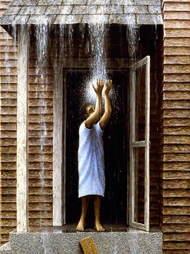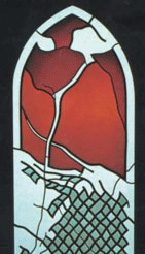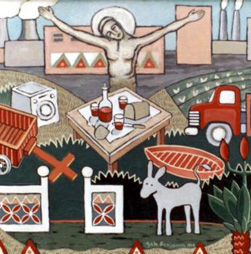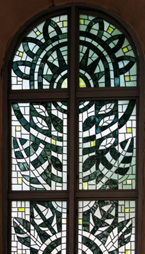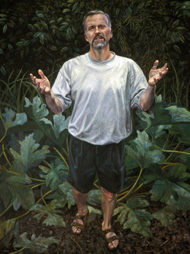The Welcome Wagon
The Welcome Wagon: I Can Cross the Sea, song and video
I Can Cross the Sea
I can cross the sea
If you’ll come with me
Take a seat beside
We’ll cross this water wide
I feel strong when we are together
I can cross the sea
If you’ll come with me
Storm and wind and waves
My courage melts away
Down below the monsters beneath us
But I know they can’t come between us
I feel strong but still will you hold my hand?
I can cross the sea
If you’ll come with me
Take a seat beside
We’ll cross this water wide
I feel strong when we are together
To take on the heaviest weather
I belong with you until we reach the shore
**
The Welcome Wagon: I Can Cross the Sea, 2020. The video captures the live recording of the song (take 12, according to Vito), as performed at the height of lockdown at St. Paul’s Luthern Church in Brooklyn. Vito Aiuto is on vocals and guitar, Monique Aiuto on vocals, Jeremy McDonald (Mason Jar Music) on bass, Evan Gregory (Gregory Brothers) on piano, and Anthony LaMarca (War on Drugs) on lead guitar and drums. The song is produced by Jeremy McDonald.
The Welcome Wagon is a married couple, the Reverend Thomas Vito Aiuto and his wife Monique, who execute a genre of gospel music that is refreshingly plain. Their hymns are modest and melodic takes on a vast history of sacred song traditions, delivered with the simple desire to know their Maker—and to know each other—more intimately. Vito was born in Tecumseh, Michigan, and attended Western Michigan University where he developed a love for writing poetry. His first book of poems, Self-Portrait as Jerry Quarry, was published by New Issues Press in 2002. A self-described agnostic, Vito experienced a spiritual conversion at the age of 20 and soon after enrolled at Princeton Theological Seminary to study theology and prepare for ordained ministry. Currently he is the senior pastor of Resurrection Presbyterian Church, a church he planted in Williamsburg, Brooklyn, NY, in 2005. Read more
Vito Aiuto writes about I Can Cross the Sea:
The moon grows full and fat, then diminishes again. A family finishes dinner, the clink of dishes in the sink, then gathers in the living room in front of the television to watch together. Next door a widow watches the same show on her own set. You buy a horseshoe at the antique market. Later on you’re eating carrot sticks and searching for information on horseshoes (Does it hurt the horse when they nail it on? No, not if it’s done correctly), and your internet goes out and is absent the rest of the day. The emptiness! Long ago you used to be so much younger, you never woke up in the night, gasping for breath, petrified, (well, wait, yes, you did, that night terrors thing in 3rd grade) but now sometimes you’re not sure you could say what life even is. You recall you’ve become unmoored like this before (isn’t it strange, the consolation contained in your previous moments of utter confusion and despair?), there’s precedent here. And after a length of time—sometimes an afternoon, sometimes a summer—you feel on top of it again. Got your bearings. Back at it! Yet the questions keep falling like leaves, sometimes flying right in your face: Does the rain have a father? Am I lovely? What are all these keys for? Why do the nations so furiously rage together? Tell me, Momma! Yet you can be sure of just one thing: Your very own broken heart is not just a mountain, it’s a whole mountain range, winding, wild, steep, indomitable, impassable, unsafe, jagged with…. Look, it’s a mountain range, that’s what I’m telling you: You can’t even understand a dandelion, let alone a mountain range, you know? And that’s where you live, in the mountain range of your broken heart, lost, lonely, drifting, underneath a sky that’s green and sick and drifting, the confusion like fog (or the fog of confusion, I don’t know which), and then…
Then some innocent afternoon arrives and there’s a door you must walk through. Just one, solitary door. Or a broomstick over which to jump: this broomstick, not another. Or you arrive at the shore of an enormous body of water and it must be crossed, there’s not another choice. And that’s the gift. I don’t mean that the journey you’re about to undertake is a gift: no way, friend, the journey is a half a nightmare: there are monsters in there (bad ones), the waves are canyons, your little bark is a goner. No, the gift is that at least you know what is being asked of you. Finally, for a moment, life is reduced to one thing: This choice. This journey. This word to say. Or not to say. This chance to forgive. This promise to keep. Or start keeping again.
This is a song we wrote for people who have to cross great seas and bear great burdens. This is a song for people who are fighting the good fight. We love you and we’re rooting for you like crazy.
